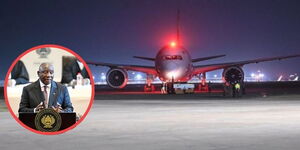Kenyans are set to start buying fuel at increased prices starting in January when Energy and Petroleum Regulatory Authority (EPRA) announces a new price review.
Fuel prices are poised to increase across the country due to the government's decision to fully withdraw the subsidy.
According to the budget outlook paper, the fuel subsidy will be withdrawn on December 31, marking the end of the programme introduced by former President Uhuru Kenyatta.
However, President William Ruto's administration will retain the subsidy programme on some agricultural products.
"The government will eliminate the remaining unsustainable and consumption-driven fuel subsidy by the end of December 2022, but will continue to offer support to agricultural production through the fertilizer subsidy programme," the outlook paper read in part.
Defending the decision to withdraw fuel subsidy, the National Treasury indicated the move aimed to sustain the country's economy.
"Medium Term Budget framework builds up on the government’s efforts to stimulate and sustain economic activity, mitigate the adverse impact of the pandemic on the economy and re-position the economy on a sustainable and inclusive growth trajectory," the paper added.
However, the government did not reveal the immediate formula which would be adopted to keep fuel prices down following the withdrawal of the subsidy programme by the end of December 2022.
According to the budget projection for 2023, the increases in fuel prices will also have ripple effects on the country's inflation rate.
"Inflation is expected to remain elevated in the near term, due in part to the scaling down of the government price support measures, resulting in increases in fuel and electricity prices," it added.
A litre of petrol in Nairobi currently retails at Ksh177.30, diesel at Ksh162.00 and kerosene at Ksh145.94, according to the price review announced by EPRA on December 14 and set to run till January 14.
In September, Ruto's administration scrapped the subsidy on petrol, arguing that it was unsustainable. Before scrapping subsidies on petrol, the government was spending Ksh20.5 per litre to keep the product's prices down.
The move reduced the subsidy burden from over Ksh14 billion to Ksh5 billion.












